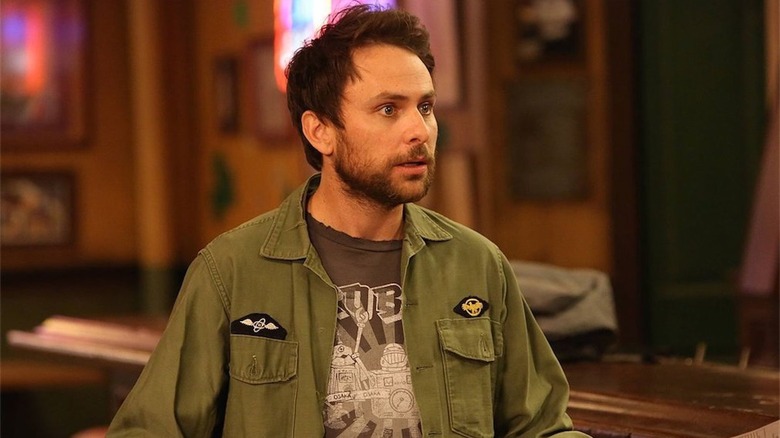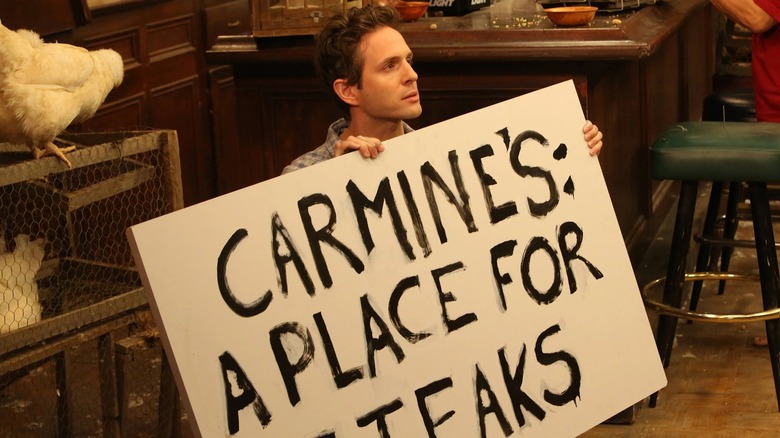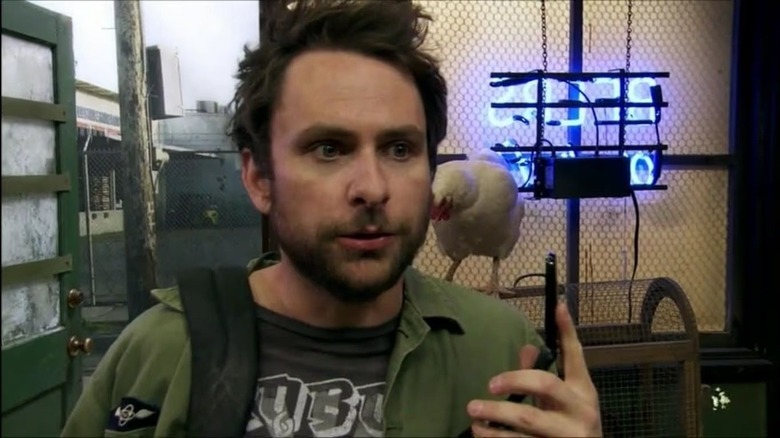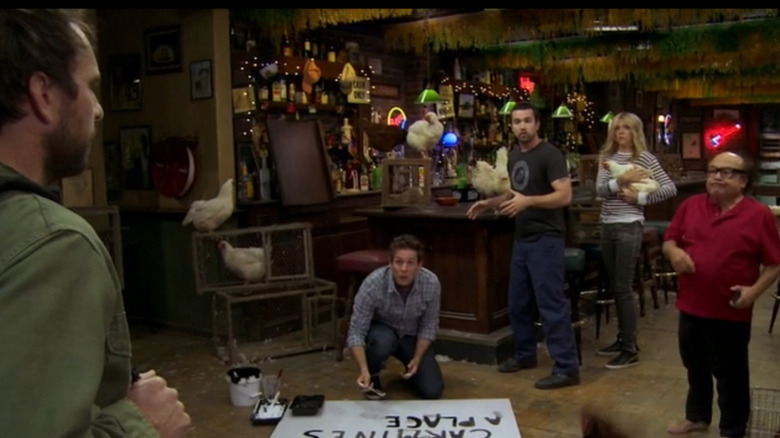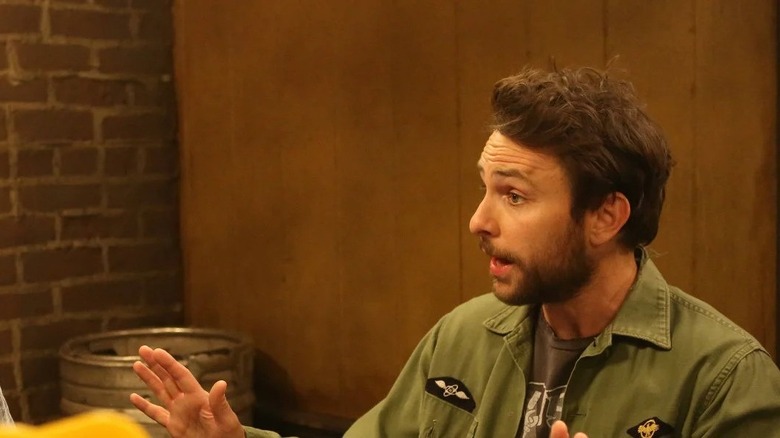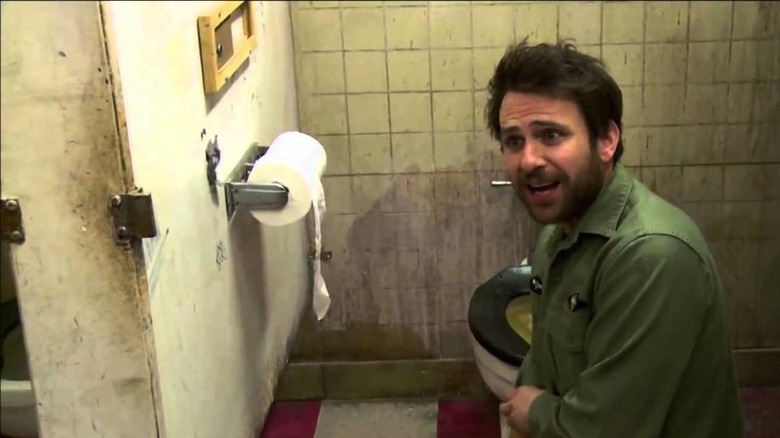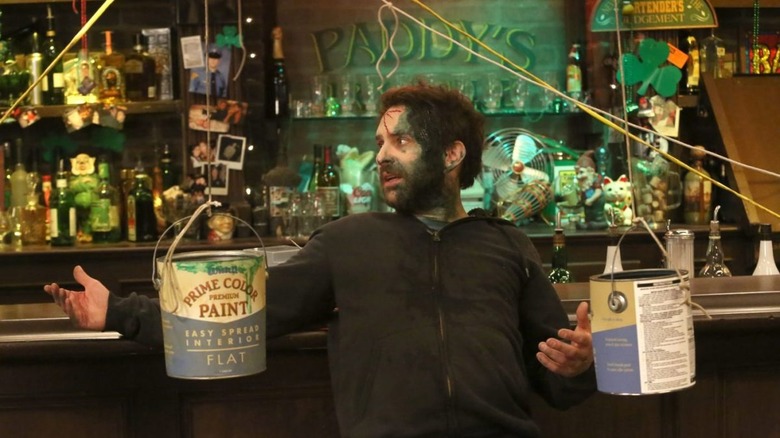The It's Always Sunny Episode That Had Charlie Day Worried About The Cameraman
"Charlie Work" is easily one of the most memorable episodes in the 16 seasons and counting of "It's Always Sunny in Philadelphia." Some of the episodes are best remembered for their off-color jokes, like "The Gang Makes Lethal Weapon 6," but other times, it's the scope of the episode that garners attention, like the ambitious musical episode "The Nightman Cometh," or the unforgettable holiday special "A Very Sunny Christmas." Even so, perhaps the most impressive technical feat of all is the one-shot wonder that is "Charlie Work."
The season 10 episode follows Paddy's Pub's resident ghoul fan Charlie Kelly as he tries to pass the bar's health inspection while the other members of the gang get up to no good, wrapped up in a scheme involving steaks, airline miles, and live chickens. The episode presented lots of technical challenges at every turn, the first of which was writing an episode that unfolds in real-time without cutting away from Charlie at any point.
"Could we write a story that has to unfold in real-time, that's interesting?" Charlie Day wondered aloud in a 2015 interview with Collider. Day stars in the series as Charlie alongside "Sunny" co-creators Glenn Howerton and Rob McElhenney, who supplement their comedic forces with the formidable Kaitlin Olson and the incomparable Danny DeVito.
Doing an episode in real-time felt like a good idea, and the most "compelling" way to execute it was to do it all in one take, Howerton added. What's more, Charlie is trying to execute his plan on a tight schedule that gives the episode some very big stakes (pun intended).
"It's a ticking clock, from the time the episode starts until it ends, there's a ticking clock and everyone is just frantically — so putting in a one-er actually services that type of story in that way," Howerton added.
Charlie Work was a challenge from start to finish
The single-shot effect certainly makes "Charlie Work" one of the more cinematic episodes of "It's Always Sunny." It calls to mind the same effect that was famously used in the 2014 film "Birdman," but as Day pointed out in a 2015 interview, "this was pre-'Birdman.'" However, they did use the extended-take episode of "True Detective" season 1 as a point of reference, which is why Howerton's character Dennis keeps doing a Matthew McConaughey impression.
"We're always looking for new ways to challenge ourselves," Howerton continued. "That's a lot where that came from. And we were kind of leaning into the fact, because I do think that episode's funny, but we were also kind of leaning into the idea that it didn't really have to be that funny, it just had to be interesting to watch."
It was interesting to watch, no doubt, but the single-shot effect presented a lot of obstacles for the "Sunny" cast and crew. The actors had to be extra rehearsed and make sure they had all their lines and their cues down pat so as not to ruin the flow of the extra-long shots. This gave them the effect of a live theater performance.
"It felt like doing a play, didn't it?" Howerton asked his co-star, who confirmed it did feel like doing a play. "I had the feeling I used to have from doing plays where you're waiting in the wings for your cue [...] You don't want to mess it up, you don't want to screw up the timing because it messes up the whole f***ing take. You don't want to be the last guy in the thing who screws it up."
Believe it or not, the actors weren't the ones with the hardest jobs on set that week — Day was more worried about the crew.
Day was more concerned for the cameraman than himself
Day knew he was under a lot of pressure to prepare for "Charlie Work" — the camera would be on him for the duration of the episode and, to create a single shot effect, shots would stretch for several minutes and involve complicated choreography. But when it came time to shoot the episode, it wasn't himself he was most worried about — it was his cameraman, who would be tracking his every move.
"Mostly I felt okay with myself [...] I'd just gone over all the dialogue enough times to know that I'd be able to run it without missing any of that," he explained to Yahoo News. "I was more concerned about our poor camera guy, Adam Sklena, who's been working with us since the first season, and how he was going to have to do this whole thing walking backwards."
Sklena was like the Ginger Rogers to Charlie's Fred Astaire, doing all the same movements backward and holding a camera — without "special dolly tracks or a pre-programmed rig," as Day pointed out to Collider. Thankfully, the camera operator did have a little help from the other camera operator, but not in the way you might expect.
It would have been impossible for Sklena to memorize every camera movement, the episode's director Matt Shakman explained in a 2015 podcast interview. Instead, "he had a guy on a headset, the other camera operator, talking him through, being like, 'Okay, Charlie's about to go to the end of the bar, you gotta get ready to pan left and become a two-shot.'"
Despite the difficulties, Day found shooting the long sequences with Sklena to be "fun," he told Collider, adding that they "have been working together for a decade, to just sort of feel in sync."
A true one-shot episode was impossible
Even though "Charlie Work" feels like it's all one shot, the longest sequence in the episode is seven minutes long, Howerton added. Seven minutes is nothing to turn your nose up about, but Day had originally wanted it to be a true one-take episode. Sadly, that was impossible because of one key logistical problem — the set of Paddy's Pub is not all connected. Shakman went into detail about how they pulled it all off on The Box Angeles Podcast:
"It was a huge logistical challenge because we had to make most of — there's a section of 12 to 14 minutes that feels like it's one shot, and it's a lot of visual effects to kind of merge things because the front of the pub is a location in downtown L.A., the interior is a set on stage at Fox, and some of those sets don't even link up. The basement's not actually downstairs from the bar because we can't dig into the floor of the soundstage and do it, so it's a separate thing. So we had to come up with some trickery and we redesigned our set so that certain things could be done in the flow — the bathroom had to get moved to this really tiny spot at the edge of the stage so we could do it all in one."
But it wasn't just the set that required an extra level of preparation. Every member of the "Sunny" crew was kicked into high gear, from the production assistants to the animal wranglers. "We've got a team of P.A.s moving live chickens, we've got makeup artists hiding behind the bar and popping up and making Glenn [Howerton] sweaty and dropping down and painting Danny [DeVito] black — it's just a full-on play," Shakman added.
The cast and crew came together to make it happen
Even if "Charlie Work" had been a total disaster, it still would have been an impressive accomplishment. When asked what his favorite part of the episode was, Day responded simply that they "pulled it off," adding that he had to tip his hat to the "Sunny" crew.
"I think it was a real testament to everyone that's been working on the show for as long as we have," he told Yahoo News. "The majority of our cast and crew have been with us since the beginning. I think just that the magic trick worked; that's the fun of doing something like that. It all just works so seamlessly. For me, that was the real joyride."
He's right to credit the crew with the success of this episode — the actors had to be well-rehearsed, but the crew had to rehearse even more. The crew had only walked the episode through with stand-ins before shooting it for the first time, Shakman confessed.
"When Charlie came down and it's basically all on his shoulders, I was like, 'Do you wanna rehearse this the whole way through, or should we just shoot this?'" he went on. "And he said, 'F*** it, shoot it.' And, it's the right answer because you might as well just shoot it, if you get lucky, it's great."
And they did get lucky — they managed to pull their longest shot off without a hitch in the very first take. "That first take was great— it wasn't the one we used," Shakman elaborated. "We ended up doing 11 or 12 takes of it, but it had that great energy the whole time, it was tons of logistical things the whole time."
The oner format brings out new 'idiosyncrasies' in familiar characters
Part of what makes the single shot episode of "Sunny" so brilliant is that it forces the audience to learn new things about the characters. The longer the camera stays on them, the more the viewer learns. The one-shot format allows them to "highlight the idiosyncrasies of these characters we know so well, and offer some surprises in the end," Day pointed out to Yahoo News. He added:
"After doing this for 10 years, whether it's Danny [DeVito] or Kaitlin [Olson] or Rob [McElhenney] or Glenn [Howerton] or myself, I think everyone just knows how to walk in a room and say, 'Hi, how are you?' as those characters. If it wasn't there in the writing, they found a way on the day to just breath more of their character into each moment so that you get to see the crazy one shot and the crazy scheme and the health inspection, and not lose who they are in the show."
Charlie, in particular, is a mysterious character, oscillating between incredible buffoonery and puzzling capability. While it might seem unrealistic for a character to contain such multitudes, Day argued that embodying two extremes is much more realistic than a one-dimensional archetype.
"I think that's more true to life than we want to admit," he explained to /Film in 2022. "I've seen some of the smartest people in the world not know how to open the wrapper of a cheese stick. And at the same time, someone who might not have the book smarts of someone else might be much more world-savvy. So I think, I like those differences."
Sklena made Charlie Work a working success
Keeping the camera on Charlie for an entire episode highlights new dimensions of his persona, an impressive feat for a series that was 10 seasons in at the time.
"I think sometimes you just have to just find that little sweet spot in between about what's too smart or what's too dumb and that's a moving target," Day continued. "But I'm glad that it's not just all one thing. I think it would get boring."
Day's performance was a huge part of what made "Charlie Work" so great, but if it wasn't for the crew's dedication and hard work, it never would have happened. Shakman had a longstanding collaboration with the "Sunny" gang and directed episodes from seasons 3, 4, 6, 7, 8, 10, and 12. Sklena continues to camera operate for "Sunny" in 2023 and has been with them since season 1.
Their combined efforts made this impressive episode one of the most celebrated among "Sunny" fans, and the top-rated episode of the series on iMDb. Since the cast and crew had so much fun shooting the episode, maybe another one isn't out of the question?
